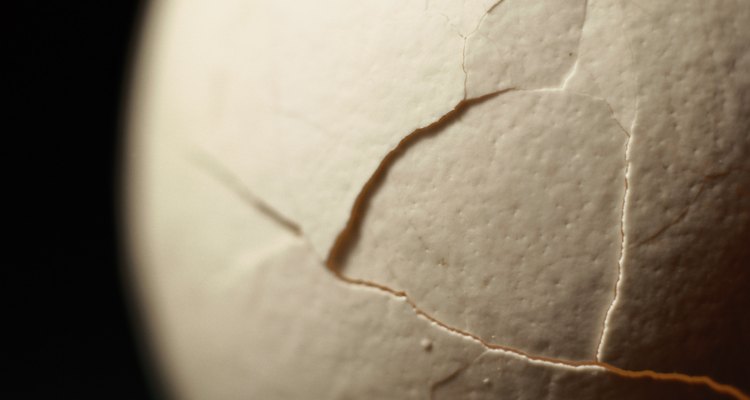
Photodisc/Photodisc/Getty Images
From the outside, the hard-boiled egg, soft-boiled egg and the raw egg all look and weigh the same – a potential source of culinary catastrophe. Thankfully, there are a few simple, fail-safe methods for distinguishing among the three and avoiding unnecessary waste. The methods for identifying the egg's internal state typically use simple laws of physics, since the interior of an egg is a viscous liquid when raw, affecting the way it behaves and moves.
Is the Egg Hard Boiled or Raw?
To determine if the egg is hard boiled or raw, conduct a simple experiment. Place the egg on its side on a smooth countertop and away from obstructions. Then, spin the egg gently. A hard-boiled egg, being solid, will spin smoothly. A raw egg, being liquid inside, will wobble.
Double-check by spinning the egg and suddenly stopping its rotation with the tip of your finger. A hard-boiled egg comes to an immediate stop and stays stopped if you lift your finger. A raw egg begins to rotate again, though more slowly, if you quickly lift your finger away from the egg.
Is the Egg Hard or Soft Boiled?
There’s no foolproof way to differentiate between a soft and hard boiled egg without cracking it open to find out. It’s best to be mindful of timing to make sure the egg is cooked to the desired consistency. To boil eggs, using a slotted spoon, lower eggs into boiling water, cover the pan, and remove from heat. For a soft boiled egg, allow it to cook for four to six minutes. For a hard boiled egg, allow it to cook for 13 minutes. In order to stop the egg from cooking, transfer it to an ice bath for 10 minutes.
There’s a trick for figuring out the difference between soft and hard eggs. Place raw eggs in a pan, just covered by cold water. Bring to a rolling boil for one minute. Remove the egg from the water it is boiling in with a slotted spoon. A hard-boiled egg, containing greater residual heat, dries in about 10 seconds, while a soft-boiled egg stays wet for up to 20 seconds.
Note: hard-boiled eggs spoil more quickly than raw eggs. Store them in their shells in the fridge after cooking, if necessary, but discard after a week.
Related Articles
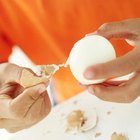
Should I Pierce Eggs Before Boiling?

Shelf Life of Hard Boiled Eggs

How to Cook Sunny Eggs in the Microwave
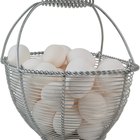
How to Write a Secret Message on the ...

How to Cook a Hard Boiled Egg With a ...

What Is the Difference Between a Fried ...
How to Fry an Egg Without It Turning ...
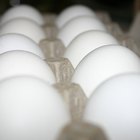
How to Store Cracked Eggs in ...

What Does It Mean if a Boiled Egg Turns ...
How to Cook Over-Easy Eggs in a ...
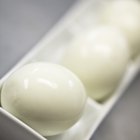
How to Make Salted Egg

McDonald's Egg McMuffin Nutrition

What Causes an Eggshell to Stick to a ...
How to Make an Overeasy Egg
How to Make Eggs Over Easy

How to Cook Eggs Sunny Side Up Without ...
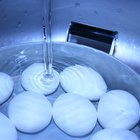
How to Overcook Hard Boiled Eggs

How to Store Egg Whites
How Long After I Cook Hard-Boiled Eggs ...

Can You Eat a Broken Egg?
References
Resources
Warnings
- Spin eggs away from the countertop, as they can easily veer off course and plummet to the ground.
- Hard-boiled eggs spoil more quickly than raw eggs. Store them in their shells in the fridge after cooking, if necessary, but discard after a week.
Writer Bio
Nick Marshall is a UK-based writer specializing in trends and best-practice in the B2B sector.
Photo Credits
Photodisc/Photodisc/Getty Images